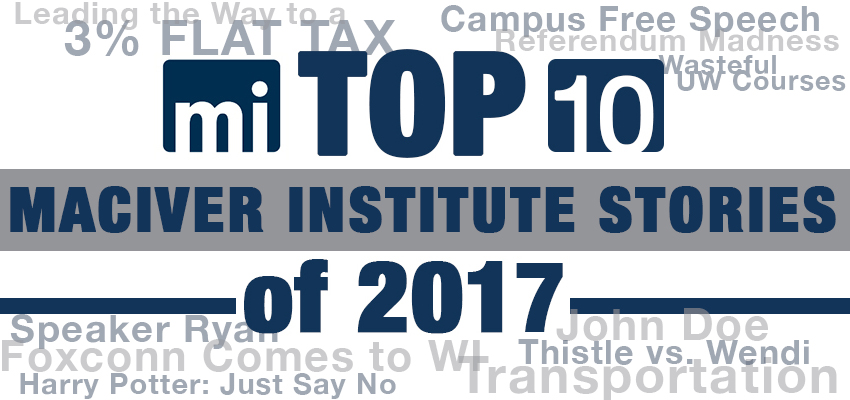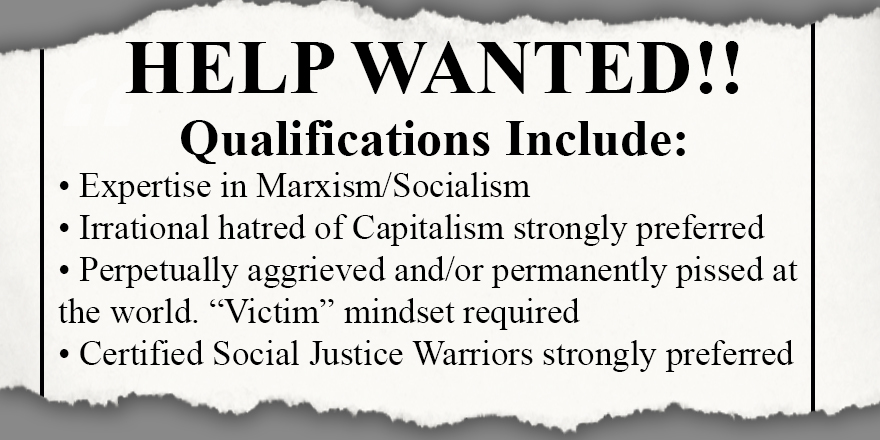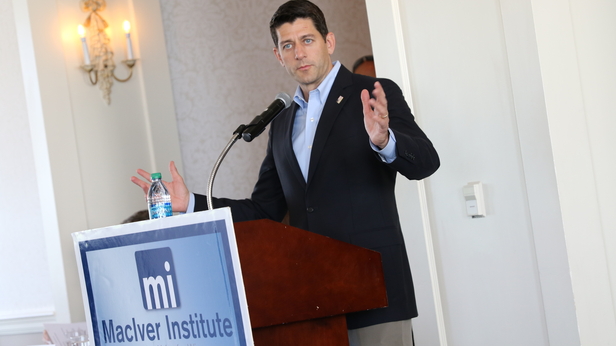
December 27, 2017
The past year has been a truly wild ride for Wisconsin – and we, your ever-vigilant friends at MacIver, worked tirelessly (and sometimes around the clock) to keep you up-to-date on the stories of the year that shaped our state and our country.
And so, we bring you the third in our series of year-end stories – the Top Ten MacIver Stories of 2017, stories that we put a particularly bright light on that will have a long-term impact on our state. In descending order, they are…
10. Harry Potter and the Prudent City Council
It seems to be an article of faith that tourism is good for local communities. However, that belief was put to the test in Edgerton when the organizers of the Harry Potter Festival wanted the city government to pitch in between $100,000 and $200,000 for this year’s festival.
They said it would bring in tens of thousands of people, which would be good for local businesses, which would be good for the city. The city council realized only a handful of people in town would benefit from that, yet everyone would be paying the bill. They rejected the festival’s request, a victory for local taxpayers and responsible government.
9. Liberal Protester Takes Harassing Transgender Activist to Court
When you believe in defending freedom of speech, you don’t always have to agree with the person you’re defending. And so even though Thistle Petterson and the MacIver Institute might not see eye-to-eye very often, we still choose to cover her courtroom battle with transgender activists, who were trying to bully her into silence.
Petterson is critical of the transgender movement, and, in response, activists have bullied her online and attempted to get her fired from her jobs. They assert there are social consequences to speech. Maybe, but disagreeing with someone’s speech does not give you license to mete out your own form of justice as you see fit.
8. Referendum Madness
There’s something to be said for letting taxpayers have a direct say in the local decisions that will impact their tax bills. Unfortunately, too often, school districts treat these local referendums as mere formalities.
Whenever voters say no to a tax increase, school officials simply go back to the polls again and again until the voters finally tap out. MacIver News explored some of the efforts to rein in these districts that don’t understand that “no” means “no.”
7. Top Five Wasteful UW Classes
What would a top ten list be without a reminder that we at MacIver are keeping an ever-vigilant eye on the UW System and its never-ending demands for more taxpayer money? Considering the constant cries of poverty from the UW, one would hope that they are responsibly spending your tax dollars before they show up asking for more.
The MacIver Institute decided to dive deeper into the UW system to find places where frivolous spending runs rampant and where cost savings can be found. Our first stop: course offerings in the UW System.
What we found were courses that degrade capitalism, praise Marxism and encourage a “social justice warrior” ideology. We wonder how many employers in the real world are looking to see if you took a class in how to be perpetually aggrieved or permanently pissed at the world?
The story garnered national media attention. The story even took on a life of its own, especially after an unhinged liberal posted on a professor’s Facebook that she could “punch her in the face,” referring to MacIver intern Jessica Murphy, who wrote the story.
Fortunately, Jessica is fine, and her story continues to shed light on what they’re teaching students at UW campuses using your tax dollars.
6. Fight for Free Speech on Campus
Efforts to snuff out conservative speech on campuses across the country dominated headlines in 2017, and Wisconsin was no exception. In November of 2016, protesters tried their best to block conservative commentator Ben Shapiro by storming the stage during his speech at UW-Madison. Shapiro had already been blocked from speaking at Marquette University.
https://t.co/1w5gikZLtf At Ben Shapiro’s UW-Madison speech, protesters marched to the front of the room to block t… pic.twitter.com/pRwEBrQ3uC
— MacIver Institute (@MacIverWisc) November 17, 2016
That set the stage for 2017, when the Legislature focused its attention on the growing problem of leftist agitators silencing the conservative message on campus. That led to the Board of Regents eventually adopting new policies and procedures for dealing with students who choose to shout down speakers they disagree with instead of providing compelling arguments of their own.
One regent, who spoke eloquently about why he supported the measures, told us his story.
In October, another conservative speaker, Katie Pavlich, spoke at UW-Madison. Her pro-Second Amendment message was met by protesters wielding – not arguments about why they think she’s wrong – but sex toys. The protesters staged a bizarre “Cocks Not Glocks” protest, but failed to explain why their ideas are better – or that they have ideas at all.
The left didn’t relent. In November, a year after the Shapiro visit, “progressive” students at UW-Stevens Point tried blocking free-market group Turning Point USA from setting up a group on campus. Their reason? They felt “targeted” by the group’s pro-market, pro-capitalism message.
And one year to the day after Shapiro was almost drummed off campus, there was a ray of sunshine when libertarian speaker Dr. Jordan Peterson, hated by the left, spoke in peace to a packed house at UW-Madison. Chalk up a victory for free, open expression!
5. Foxconn Makes Wisconsin Home
When Donald J. Trump was running for president, he promised to make his central focus attracting and retaining American manufacturing jobs. So it didn’t come as a surprise that, when visiting a Snap-on plant in Kenosha in April, the new president strongly hinted Wisconsin would soon get good economic news.
That comment by President Trump transformed into a months-long, at-times dramatic saga of negotiations, deal-making, legislative action, and a final contract signing between the electronics manufacturing giant and the State of Wisconsin. The deal – the largest of its kind in American history – offers Foxconn up to $3 billion in tax incentives if the company invests $10 billion in a massive manufacturing campus, creating 13,000 jobs.
The deal – opposed by most Democrats, who rotated through a litany of dubious claims – is now on track to begin construction in 2018.
Dems roll out “foreign corporation,” other familiar talking points in talking abt their amendments to #Foxconn bill pic.twitter.com/gqNDC7koIo
— MacIver Institute (@MacIverWisc) September 12, 2017
Foxconn’s Wisconsin operation won’t just be a plant, it will be a small city unto itself located in southern Racine County. The obvious benefit to the region compelled Rep. Peter Barca (D-Kenosha) to break ranks and vote for the deal, costing him his role as Assembly minority leader as Democrats chose politics over prosperity.
After Dems said they doubt #Foxconn jobs would actually come through, @SpeakerVos caught @PeterWBarca in a moment of double-speak. #wiright pic.twitter.com/RNGLXQZ2u6
— MacIver Institute (@MacIverWisc) August 18, 2017
MacIver was there at every step of the process – from Trump’s Kenosha visit, to the rollout gala at the Milwaukee Art Museum, WEDC’s approval of the contract with the company, and the final contract signing. We will continue to watch as dirt is turned and people are hired for this truly transformational project.
4. MacIver Shines Light On Transportation Debate
Emotions ran high during the state budget transportation debate, and the mediascape quickly became littered with misinformation and false narratives. As with every issue, the MacIver News Service approached this one with a healthy dose of skepticism. The result was a steady stream of original and insightful coverage that pressured lawmakers into a more critical examination of how the state spends money on transportation.
There’s no secret to getting great stories like these. Sometimes, you just have to follow up on a comment in the newspaper or at a public hearing. That’s how we learned about the DOT over-engineering run-of-the-mill projects.
By calling and talking to local public works officials, we learned how local governments are responsible for maintaining local roads. Prior to this story about Milwaukee’s road system, there was a widespread belief that the state was responsible for any road needing repairs in the state.
Then we looked at which counties had the best roads in the state and who had the worse. We learned having the right people in charge can be far more important than funding levels. It even turns out that there is actually no connection between spending and the best local roads in the state.
Finally, we came across tons of questionable transportation projects throughout our research. Remember, all budgets (even transportation budgets) come down to priorities. Every dollar spent on something like a bicycle roundabout is one less dollar you can spend on your thoroughfare or bridge repair. Sometimes we had a little fun with these…
3. MacIver Hosts Speaker Ryan
As summer ran on and the debate over the state budget continued, the MacIver Institute hosted one very special guest: House Speaker Paul Ryan. The Janesville Republican was the keynote speaker at our luncheon in July, right here in Madison.
The focus of his speech? The Wisconsin Way. Ryan praised the reforms of Gov. Scott Walker and Wisconsin’s conservative legislature, especially the landmark reforms of Act 10. Grover Norquist, president of Americans for Tax Reform, introduced the Speaker with an apt explanation of the Wisconsin Way: “When Scott Walker and the Legislature took on all the unions, that made it possible for other governors and congressmen to do the same,” Norquist told MacIver News Service.
“Every time you get it right in Wisconsin you are getting it right for others who can follow the lead of Wisconsin.”
2. Reporting the Facts of John Doe
We’ve learned a lot more about the investigators and bureaucrats involved in Wisconsin’s infamous John Doe investigation thanks to a recent bombshell report by the state Department of Justice. The report into illegal leaks of court-sealed John Doe documents to the liberal Guardian newspaper found the politically motivated investigation into dozens of conservative groups and Gov. Scott Walker’s campaign was darker and more sinister than even the people targeted suspected.
DOJ investigators conclude that in all likelihood the leaks came from inside the now-defunct state Government Accountability Board, a partner in the so-called “John Doe II” investigation found to have “commingled” thousands of private communications in folders labeled “Opposition Research.”
Perhaps the report’s findings came as little surprise to readers of MacIver News Service’s investigative reports into former GAB director Kevin Kennedy this year. In December 2016, the former state speech cop addressed his regulator friends at the Council on Governmental Ethics Laws (COGEL) annual meeting in New Orleans. Sources provided MacIver with audio of Kennedy’s presentation.
In defending himself to a room full of sympathetic bureaucrats, Kennedy cited the Guardian article and directed audience members to the hundreds of leaked documents included in the piece. That would seem to violate Wisconsin’s John Doe law and court orders requiring the probe’s officers to follow the John Doe’s stern gag orders – the same secrecy mandates that John Doe investigators hung over the heads of conservative targets with threats of jail time and hefty fines.
“I think that from what I know and the notes that I saw, he probably did violate the John Doe confidentiality requirements,” Madison attorney Dean Strang, who represented one of conservatives targeted in the John Doe, told MacIver News in July. “It seems to me that is a real concern, that he was disclosing information that by statute can’t be disclosed in that setting or by that person.”
Kennedy retired from the Government Accountability Board last year before he was forced out by the Legislature. Now, Kennedy could be facing contempt of court charges, recommended by Attorney General Brad Schimel in the wake of the DOJ investigation into the John Doe investigators.
Rest assured, your friends at MacIver won’t be letting go of this one any time soon.
1. MacIver Flat Tax Report (released January 2017)
We started 2017 strong by releasing our signature report in January. In “A Glide Path to a 3% Flat Tax: Comprehensive Tax Reform for a More Competitive Wisconsin,” we make the economic case for a fairer, flatter tax code in our beloved state. Governor Walker and the state legislature have made tax reform a priority for Wisconsin, but the state must do more if it is to be truly competitive in a 21st century economy. The answer? A flat tax.
A systematic glide path to a 3 percent income tax rate would give Wisconsin the most competitive income tax rate among Midwestern states while greatly improving the state’s attractiveness on a national level. Accomplished over eight years, state government would have enough time to adjust spending levels and make intelligent cuts. Ultimately, this is not just about putting more money back into Wisconsinites’ pockets – it is about shrinking the size and scope of government.
Praised publicly by state legislators, a similar flat tax “road map” was proposed by Assembly Republicans just a few short months after our own report. As Washington, D.C. makes its own long-overdue changes to the tax code, all eyes have turned to the states.
Watch for more in 2018 as MacIver continues to lead the conversation on tax reform.

